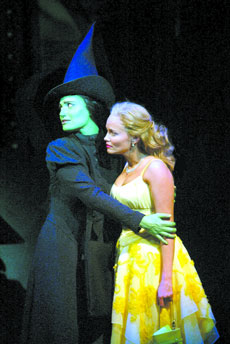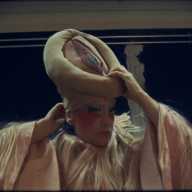Ambitious musical loses courage of convictions in second act
Whatever your ultimate feeling about “Wicked,” the new Stephen Schwartz musical that bills itself as the “untold story of the witches of Oz” and is based on a 1995 cult novel of the same name, you will be neither bored nor angry. And, given the current state of all things Broadway, that’s not a bad thing.
You will doubtless feel overwhelmed, intentionally and often impressively, by what is a production on a scale not seen since the “Les Miz,” “Phantom” and “Miss Saigon” machine shows set a new standard for musicals. You will be impressed by much of the company and a handful of the songs. But you may also end up feeling slightly disappointed, or confused, with a nagging feeling at the back of your mind that you really need to see the show again to understand why a musical that has so many elements that could make it great never fulfills its promise.
As a piece of theater, “Wicked” has echoes of “Titanic,” which, like its namesake, fell apart under its own weight. The latter started out to be about man’s hubris in the face of his construction of God and then fell prey to a need to get the story told with a kind of “damn the intellect, full speed ahead” approach that delivered a more devastating hit than the iceberg.
So, too, in “Wicked,” what keeps one on the edge of the seat in the first act is not the outsized production nor the tricks played with a familiar storyline. It is the promising feeling that the musical is being used the same way Bertolt Brecht harnessed the story of the founding of New York in “Knickerbocker Holiday” to deliver a searing political satire.
Winnie Holzman’s book, at least in the first act, is a fascinating study of greed, the drive to acquire power, its uses and manipulations, and the condescension those who seek absolute power betray toward the populace. (Woe to anyone, though, not intimately familiar with the movie “The Wizard of Oz,” since some elements of “Wicked” could be baffling.) Ms. Holzman writes the character Glinda (Kristen Chenoweth) as a craven, power-hungry, and resentful woman, driven to power by solipsistic cynicism and for whom no dirty trick is too low and no life too precious to stand in the way of achieving her goal. All the while, of course, this “good witch” presents an image of wholesomeness and righteousness. The parallels drawn to the Bush administration may be a tad too cute, but to see them in the context of this familiar tale is fun nonetheless. The show’s tension comes from Glinda’s conflict with Elphaba, a sensitive and feeling woman who, though green, is not really wicked at all but a committed (presumably liberal) visionary.
By invoking the “Ozian” version of the Patriot Act, however, Glinda makes Elphaba look like the enemy and force her to move westward. Glinda also manipulates the puppet figurehead––in this case the Wizard—so she can work her pernicious agenda. So crafty and dishonest is she that one assumes that when Glinda floats off on her bubble contraption, she is going to a “secret undisclosed location.” In fact, her first landing on the deck of the Gershwin Theatre, lacks only a “Mission Accomplished” banner behind her to complete the distraction and manipulation of the awed spectators of the Emerald City.
If all of this seems a bit heavy-handed, it is. Yet, it’s been a long time since a musical approached anything like substance. Ms. Holzman’s first act is full of sly references to popular culture. Using the Munchkins’ ethnicity and Elphaba’s green skin as marginalizing tactics forces one to reconsider a story that has been familiar for most since childhood and by extension asks us to look more closely at the stories that we are being told by those in power on a daily basis.
L. Frank Baum’s original, early 20th century novel, “The Wonderful Wizard of Oz,” has long been subject to political/ social interpretation, and it’s fascinating to see how a story that has been bowdlerized and rendered exclusively juvenile over the years by Hollywood regains some bite.
By the end of the first act, Glinda has learned, as the Wizard advises her, that every great leader needs an enemy. It is a chilling moment, and Glinda sets up Elphaba to be that enemy. The final number of the first act, “Defying Gravity,” is at once an inspirational anthem that is a classic call to passionate action and a chilling foreshadowing of how that passion can be manipulated by those who care only for themselves.
But then the excitement never pays off. The second act turns into a run-of-the-mill, crowd-pleasing musical, complete with a vapid hero realizing he has convictions––and even a brain––after all. There are power plays, and then a rush to tell the story of Oz with all the familiar ends tied up, even leaving space for a trick that ensures a happy ending. The plot becomes so inflated and obsessed with being politically correct regarding its ethnic themes that there is no time to explore the conflict between Glinda and Elphaba in any meaningful way.
That’s too bad because what at intermission seemed fresh and involving lets go of its grip on the audience, and lets it off the hook. For all the flying monkeys, incredible sets, and bravura performances, the show loses its ability to thrill and merely entertains.
The company is excellent, but uneven. Kristen Chenoweth as Glinda is mostly stunning. Her amazing voice and wonderful presence is absolutely suited for the role, said to have been written with her in mind. She perfectly embodies the churning evil underneath the perfect exterior, evincing a full range of brilliance from opera to pop. And she has never sounded better. If some of her mannerisms and inflections seem to come from her usual bag of tricks, those are the tricks that have given Ms. Chenoweth a deserved loyal following. Not since Ethel Merman has there been a Broadway star with such a readily identifiable set of idiosyncrasies of performance that one eagerly awaits to see in each new production. Yet Ms. Chenoweth is also an accomplished actress so the star power never overwhelms the role.
As Elphaba, Idina Menzel is a revelation. How she manages to be so beautiful and powerful under all the green make-up is testament to the magic of the theater. She goes from seeming young and frightened to being impassioned and indomitable (except when confronted by water), and her voice is simply magnificent. She has the better songs in the score and is a powerful actress in her singing.
Norbert Leo Butz as Fiyero, the initially insubstantial love interest, is, as always, engaging and a wonderful presence on the stage. He brings a level of sensitivity to a superficial role that is consistently exciting. His voice and vocal technique represent the best of contemporary Broadway, as he fluidly moves between styles yet always seems emotionally connected to the score.
Of the other members of the company, Joel Grey gives his usual “please like me” performance, which is fine for the paper tiger the Wizard is supposed to be. Carole Shelly as a schoolteacher turned political operative is fine, and Christopher Fitzgerald as Boq, a Munchkin and the counterpoint to Fiyero is consistently fine.
Stephen Schwartz’s score is largely strong, and intriguing. It’s one that bears hearing several times, so the cast recording will be eagerly anticipated. There is a nice mix of song styles and one or two, “Defying Gravity,” “For Good,” for example, that may even have a life outside the show.
The set by Eugene Lee is astonishing, as are all the elements of the production, including Susan Hilferty’s costumes and especially Kenneth Posner’s lighting.
“Wicked” is a huge, entertaining show and for that alone deserves to be seen. It represents some of the finest talent working on Broadway right now. Ms. Chenoweth and Ms. Menzel are worth the price of admission. The unfortunate thing is that what might have heralded a return of the political musical ends up a slightly more topical “Beauty and the Beast.”





































